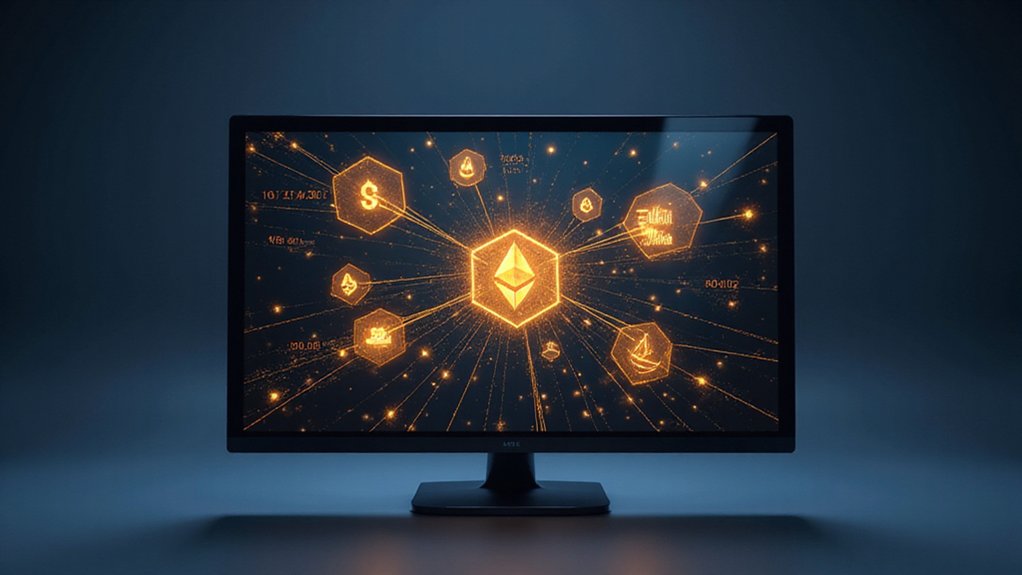Etherscan serves as Ethereum’s definitive block explorer, functioning like a Bloomberg Terminal for blockchain data where users can track transactions, analyze smart contracts, and monitor wallet portfolios without storing private keys. Simply input transaction hashes or wallet addresses to reveal transfer details, gas fees, and token holdings—transforming cryptographic complexities into digestible financial intelligence. This analytical powerhouse processes Ethereum’s approximately 21.1 TPS through structured databases, though mastering its full investigative potential requires understanding its deeper architectural nuances.

While traversing the labyrinthine world of Ethereum transactions might seem as intimidating as deciphering ancient hieroglyphics, Etherscan serves as the Rosetta Stone for blockchain explorers, transforming incomprehensible strings of alphanumeric characters into digestible financial intelligence.
Launched in 2015 by blockchain enthusiasts who apparently recognized that transparency without understandability remains merely sophisticated obfuscation, Etherscan functions as a search engine for Ethereum blockchain data. Unlike cryptocurrency wallets that store and transfer tokens, this platform operates purely as an analytical tool—think of it as the Bloomberg Terminal of decentralized finance, minus the $24,000 annual subscription fee.
The platform’s primary utility lies in transaction tracking, where users input transaction hashes or wallet addresses to reveal detailed transfer information including sender, recipient, timestamps, and gas fees. This proves invaluable for traders and businesses requiring verification of payments, particularly when dealing with the occasionally glacial pace of blockchain confirmations that can make wire transfers seem lightning-fast by comparison.
Smart contract analysis represents another cornerstone feature, allowing users to examine contract addresses, view source code (when available), and analyze the intricate dance of decentralized applications. For developers and auditors, this transparency provides essential insights into contract integrity—assuming, of course, that the contract wasn’t deployed by someone who considers “audit” a four-letter word. The platform essentially displays information from Ethereum’s decentralized digital ledger, which maintains identical copies across all network participants to ensure data integrity.
Portfolio tracking capabilities enable users to monitor account balances and token holdings across multiple wallets without requiring private keys or login credentials. Simply enter a wallet address to reveal its complete transaction history and diversified token portfolio, making it remarkably easy to conduct due diligence on potential counterparties or satisfy one’s curiosity about whale movements. The platform provides comprehensive access to various Ethereum activities including ERC-20 token transfers, NFT minting events, and detailed wallet balance information.
The platform’s technical architecture relies on Remote Procedure Call protocols to continuously retrieve data from Ethereum nodes, indexing this information in structured databases that eliminate the need for manual blockchain scanning. The user interface translates this complex data into accessible formats through charts, summaries, and organized results accessible via a straightforward search bar. Current network statistics reveal approximately 21.1 TPS as the standard transaction processing rate for Ethereum operations.
Additional features include gas trackers, token analytics, and verification badges, creating a thorough ecosystem for blockchain analysis that makes traversing Ethereum’s financial landscape considerably less archaeological in nature.
Frequently Asked Questions
Is Etherscan Free to Use or Are There Paid Premium Features?
Etherscan operates on a freemium model—basic blockchain exploration remains entirely free, encompassing transaction tracking, wallet lookups, and smart contract verification.
Premium features emerge through API access, where developers encounter rate limits on free tiers while paid plans grant access to higher request volumes and enhanced endpoints.
The irony? Most users never need premium features, yet businesses integrating Ethereum data inevitably graduate to paid tiers for operational scalability.
Can I Use Etherscan to Track Transactions on Other Blockchains Besides Ethereum?
No, Etherscan exclusively tracks Ethereum blockchain transactions and cannot monitor other networks like Bitcoin or Binance Smart Chain.
Users must employ dedicated explorers for alternative blockchains—BscScan for Binance Smart Chain, PolygonScan for Polygon, or Blockchain.com for Bitcoin.
Cross-chain bridge transactions reveal only Ethereum-side activity, requiring multiple explorers for thorough visibility.
This specialization, while limiting multi-chain convenience, guarantees Ethereum’s transaction data remains extensively tracked.
How Accurate and Real-Time Is the Transaction Data Displayed on Etherscan?
Etherscan’s transaction data achieves remarkable accuracy by directly mirroring Ethereum’s immutable blockchain records—amounts, addresses, and timestamps remain precisely identical to on-chain data.
Updates occur within seconds through multiple RPC endpoints, though predicted confirmation times fluctuate based on network congestion. While pending transactions may occasionally disappear (dropped or replaced), confirmed data maintains absolute reliability.
The platform’s real-time performance depends on Ethereum’s decentralized network conditions, delivering consistently prompt updates.
Does Using Etherscan Compromise My Wallet Privacy or Expose Personal Information?
Etherscan doesn’t compromise wallet privacy beyond blockchain’s inherent transparency—it merely displays publicly available transaction data.
The platform doesn’t collect personal information, though wallet addresses remain pseudonymous until external correlations emerge. Users risk de-anonymization through transaction patterns, repeated address usage, or public disclosure of their addresses.
While Etherscan itself poses minimal privacy threats, the underlying blockchain architecture guarantees all activity remains permanently visible to anyone with sufficient analytical determination.
Can I Set up Alerts for Specific Wallet Addresses or Transactions?
Yes, Etherscan’s Watch List feature enables users to monitor specific wallet addresses with customizable email alerts for incoming and outgoing transactions.
After creating an account, users can add multiple addresses with descriptive labels and select notification preferences.
However, practical limitations exist—50 daily alerts and 200 emails maximum—making this feature unsuitable for hyperactive smart contracts but excellent for tracking whale wallets or key market participants strategically.









